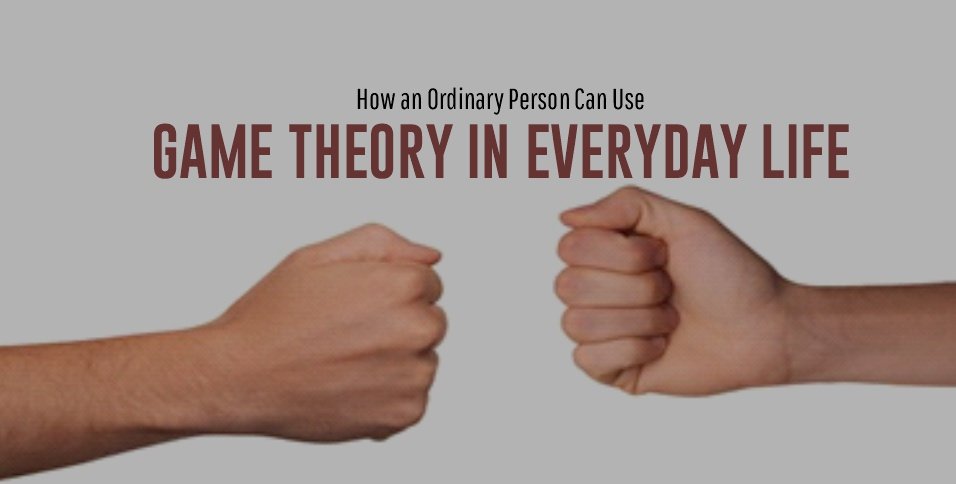Contrary to popular belief, game theory isn’t just utilized by economists and political scientists; it can be implemented in our everyday lives as well, such as in board games, poker, and war, and can be used to identify the optimal outcomes for each player.
In this blog post, we’ll explore some ways in which an ordinary person can use game theory to make better decisions and achieve their goals.
What is Game Theory?
Before we learn how to use game theory in our everyday lives, let’s first understand what it is. Game theory is a way of using math to look at different situations. It looks at when multiple people make decisions and have strategies. These strategies can be either friendly or competitive. The goal is to find the best strategy for each person.
Game theory is a branch of mathematics and economics that looks at how players make decisions in strategic situations. It uses tools from mathematics, economics, and psychology to analyze how people make choices when their outcomes are dependent on the actions of others. Game theory examines how people interact in a variety of games and can be used to identify the optimal outcomes for each player.
The most well-known application of game theory is The Prisoner’s Dilemma. Take two offenders who were detained following an arrest as an example. The prosecution lacks concrete proof to prove their guilt. Officials, however, take the inmates out of their isolation cells and question each one separately in order to extract a confession. The two prisoners are unable to speak with one another. Authorities present the following deals:
- They each face a five-year prison sentence if they confess.
- Prisoner 1 will receive three years and Prisoner 2 will receive nine years in the event that Prisoner 1 confesses but Prisoner 2 does not.
- Prisoner 1 will receive a 10-year sentence and Prisoner 2 a two-year sentence if Prisoner 2 confesses but Prisoner 1 does not.
- Each person will spend two years in prison if neither confesses.
The best course of action is to remain silent. Although neither is aware of the other’s plan, both are quite likely to confess and face a five-year prison sentence as neither knows the other’s strategy. According to the Game Theory, both players in a prisoner’s dilemma will choose a course of action that is better for them individually but worse for them as a whole.
Applying Game Theory in Everyday Life
Getting a Job
An example of how an ordinary person can use game theory in everyday life is deciding what job to take. Suppose you are choosing between two similar jobs that both offer good salaries and benefits. You can use game theory to determine which job would be the best choice by looking at the strategies each potential employer may have. For instance, one company may be willing to offer a higher salary, but the other may be more likely to promote you. Game theory can help you determine which job would give you the most benefit in terms of salary and career advancement.
Negotiations
Negotiations are a common occurrence in everyday life, whether you’re negotiating a salary with your boss or trying to decide where to eat with your friends. Game theory can help you approach negotiations strategically by considering the other party’s interests and preferences.
For example, if you’re negotiating a salary with your boss, you could use game theory to determine your bargaining power and identify potential outcomes that would benefit both parties. By doing so, you’ll be more likely to reach an agreement that satisfies both parties.

Social Interactions
Social interactions often involve cooperation or competition between individuals. Game theory can help you analyze these social interactions by considering the benefits and costs of different actions. For example, if there are already too many people at the party, attending might not be worth it because it would lead to overcrowding and less enjoyment for everyone involved.
Investment Decisions
Investment decisions often involve risk-versus-reward calculations. By using game theory models like expected utility or decision trees, one can weigh up possible outcomes before making any investments; this helps avoid over-investing in risky assets while still maximizing returns over the time horizon chosen for investment purposes.
For example, when choosing between two stocks, one needs to take into account possible gains and losses from each stock along with the likelihood of those events happening; then compare them against each other using expected utility analysis, etc., ultimately helping one make informed decisions regarding which stock(s) best fit their investment goals.
Playing Card Games
Game theory can be used in playing card games by analyzing the different possible outcomes of a game and determining the best strategy to use based on those outcomes. For example, game theory can be a useful tool when learning how to play texasholdem. In Texas Holdem, game theory can help you determine when to fold or raise based on the cards you have and what your opponents might have. By using game theory, you can make more informed decisions and increase your chances of winning at Texas Holdem when you decide to play at GGPoker, the world’s largest poker room.
Personal Finance
Game theory also helps us understand how we make financial decisions, such as saving money or paying off debt. For instance: If someone has high-interest debt on credit cards they should focus on paying down debt as quickly as possible (even if it means reducing savings) rather than investing money elsewhere since higher interest rates mean greater losses over time; whereas lower interest debts may allow them to invest or save more without worrying about losing out on potential earnings due lack of liquidity etc.
By applying game-theoretic models, one can weigh up the pros and cons of different financial choices, thereby making better overall choices.

Conclusion
In conclusion, game theory isn’t just limited to academics and professionals; anyone can use its principles in everyday life. Whether it’s negotiating with your employer or deciding where to invest your money, understanding strategic decision-making processes allows us all to become better decision-makers over time, leading us toward our desired outcomes.
















